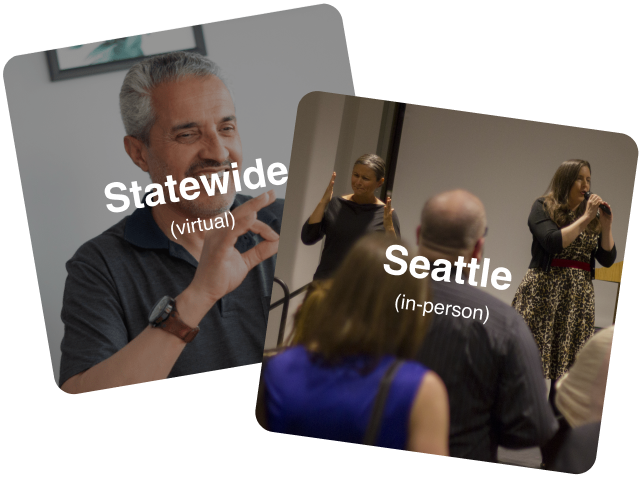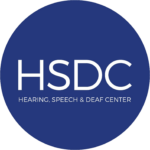We offer more than
just interpreting!
We are a one-stop shop for all of your communication and access needs, including sign language interpretation, captioning and print and media accessibility.
Office
Seattle office
1625 19th Avenue
Seattle, WA 98122
Hours
Monday – Friday
8 am – 5 pm
Contact
Scheduling Email:
interpreting@hsdc.org
Billing Email:
interpretingbilling@hsdc.org
Main Line (voice): 206-632-7100
Billing (voice): 206-388-1276 “option 1”
Videophone: 206-445-7434

About Us
We provide a comprehensive suite of accommodations and content solutions meticulously crafted to ensure that your content, videos, announcements, and information are not just accessible, but fully inclusive to all individuals within your network, whether they be employees or those you serve, including captioning, adding interpreters to your pre-recorded content and a variety of other solutions to make your content more accessible. With our expertise, we guarantee that no one is left behind when it comes to accessing vital information.
Our Services
Interpreting
We provide in-person and remote interpreting in a wide variety of settings for Deaf, DeafBlind, and hard of hearing individuals or groups. The interpreters we work with are highly qualified, enabling them to communicate with Deaf and hard of hearing people with a broad range of communication styles.
The following types of interpreting are available:
- ASL
- Signed English (PSE) Transliteration
- Signed Exact English (SEE)
- Tactile ASL, tactile, and close visual interpreting for individuals who are DeafBlind
- Oral translation for deaf or head of hearing individuals who rely on speechreading
If you are not sure what kind of interpreter you need or how to get started, just contact us. We also have a FAQ that may answer some of your questions.
Video Remote Interpreting
In addition to in-person interpreting, we offer remote interpreting to clients in Washington State and across the nation. VRI appointments take place over a video connection on a computer, laptop, or tablet. Remote interpreting may be appropriate for certain situations such as meetings, emergencies, or appointments in rural areas with limited access to in-person interpreters.
ASL Interpreting Screening
We offer a variety of services when it comes to interpreting screening. Non-certified interpreters can be screened to accept work through us. Certified Interpreters can be screened for skills development and mentorship recommendations. Organizations needing to hire a full time interpreter can use our services to screen candidates.
ASL Interpreters for Videos
If you have pre-recorded video content that is not currently accessible, we can add subtitles or captions, transcripts, we can embed an ASL interpreter into the video, or any combination of these services.
QR Codes
Many people don’t realize that English text is not the same as ASL. We can take paperwork such as intake forms, legal documents, etc and turn them into ASL by creating a custom QR code for you that will link your Deaf client to a pre-recorded ASL video of your content
Continuing Education Units (CEUs)
HSDC is committed to providing resources and opportunities for ASL interpreters through our Continuing Education Program. We have you covered from virtual mentorship to certification maintenance (CEUs) and RID Testing.
Need CEUS? We cover all areas of RID CEUs including: Independent Study, Academic Coursework, PINRA, or helping your own event become RID sponsored. You can email our CMP (Certification Maintenance Program) Administrator, Trista Smith at CEU@HSDC.org to answer any RID CEU related questions. Please check out our CEU site at HSDCCEU.org for our full catalog.
Workshops on Cultural Competency
We can provide workshops tailored to any audience of any size on a range of topics including Deaf culture and etiquette, the Americans with Disabilities Act and how it applies to you, how to make workplaces accessible, top Do’s and Don’ts, how to work with ASL interpreters and more.
Trainings for Workplaces or Agencies
We can create customized content such as presentations, videos and modules specifically for your staff, customer service reps and frontline personnel on how to work with ASL interpreters and interact with Deaf and DeafBlind customers.

We provide in-person and virtual American Sign Language (ASL) interpreting around the Puget Sound area and beyond.
Why Choose HSDC Interpreting Services?

80+ Years of Trusted Service
The Hearing, Speech & Deaf Center has been serving Western WA for more than 80 years, providing support to individuals and families.
We Get It Done Right
Not only do we offer our own in-house skills screening and assessment process, we offer in-house Continuing Education, internships, and real-time one-on-one mentorship that can build any skills that a new interpreter might need.
Top Experts
Our agency employs both hearing and Deaf staff, and our interpreting department is staffed with industry experts whose knowledge and skill are second to none.
We Are an One-Stop Shop
In addition to interpreting, we also provide a full range of accommodations and content solutions that make your content, videos, announcements and other information fully accessible to anyone you employ, or anyone you might serve.
Community at Our Core
We know ASL and the Deaf & DeafBlind communities because they are our friends, family and co-workers. We strive to always keep a focus on equity and inclusion.
FAQs
How do I know an interpreter is qualified and why can’t I just use someone in my office who knows sign language to interpret or patient’s family member?
We understand that not everyone knows ASL so it can be tough to know if an interpreter is effective and doing a good job. HSDC helps with that! Every interpreter that works with HSDC has been personally vetted and has passed our standards for qualification. Since professional interpreters are highly trained and possess skills and knowledge that a colleague or family member does not, you cannot substitute either colleagues or family members for professional interpreters, especially as there is no guarantee of quality, accuracy, or confidentiality of information when using a person who works in your office or a family member. In many cases, it’s easy for unintended damage to be done by someone trying to help, whether it’s a misunderstood message, censoring of sensitive information or a personal bias that can influence a professional outcome.
Who is required to pay for an interpreter?
Businesses and community organizations are responsible for paying for sign language interpreting services to comply with the terms of the Americans with Disabilities Act (ADA) mandates that “title II entities (State and local governments) and title III entitles entities (businesses and nonprofit organizations that serve the public) communicate effectively with people who have communication disabilities.”
Why is there a minimum fee for every job?
There is a two-hour minimum charge for interpreting services, also known as a call-out fee. This fee is an industry standard for several reasons, chief among them that it helps keep interpreters in the field. Interpreters are rarely able to work 40 hours like a standard office job due to the unpredictable nature of appointments, time lost to traffic and commuting, and the physical impossibility of booking back-to-back appointments to fill their day. This fee is one more way of addressing the national shortage by increasing interpreter retention.
Can I just use captions or auto-captions? Aren’t English and ASL basically the same?
ASL is not a signed form of English nor is it a universal language used by deaf people around the world. Since English and ASL are in no way the same language, asking a Deaf person who has requested an interpreter to use captioning or auto-captions is still asking that person to access information in a second language or one in which they may not have proficiency.
How far in advance should I request an in-person or remote interpreter?
There’s never too much advance notice! Interpreters are a scarce resource, and demand far exceeds the supply. The farther in advance you can plan the better! This is especially true for in-person interpreting. However, if you have a sudden need that’s popped up on short notice, it’s not a problem! We will always try to find an interpreter for every request, no matter how soon it’s happening.
Why do I sometimes need one interpreter, sometimes two and other times need a Deaf Interpreter (DI)?
Interpreting is a taxing activity both mentally and physically. Therefore, the general rule is that any assignments over 90 minutes should have two interpreters so that they can take breaks every 15 or 20 minutes. These breaks ensure that the interpreter is mentally fresh when they resume work. Please note, assigning two interpreters for any requests over 90 minutes is just a general guideline. Some shorter assignments might need two (or three) while some longer assignments might be fine with just one. Our team of schedulers are well-trained to know how to cover each request, and we will never assign more interpreters than are absolutely needed. A Deaf interpreter (DI) most often works in a team with hearing interpreters. A DI is an individual who is deaf or hard of hearing and possesses excellent communication skills in both American Sign Language and written English. The DI has been trained in the role and ethics of an interpreter and may also have specialized training in use of gesture, mime, props, drawings, home signs, and matching sentence structure and language development of the deaf person they work with.
I’m struggling to get my appointments filled and/or get a BIPOC interpreter. Why is this happening and what can I do?
Unfortunately, many people around the country are struggling to get their interpreter requests filled. There is a shortage of qualified interpreters around the country, and of the few qualified interpreters available, only a small number are people of color. What can you do? Flexibility is key! Most customers call us and request an interpreter for a specific time and day, and we do our best to meet that need. But, if there’s any possibility of being flexible, the chances of finding an interpreter who’s available go way up! Things to consider: Can your appointment be on a different day if needed? Does your appointment require an in-person interpreter, or would a remote interpreter (via Zoom, etc.) also work? The more flexibility you have, the better your chances of getting an interpreter to accept your assignment. Email interpreting@hsdc.org to discuss how your situation could be made more flexible, we are here to help!
Resources for Interpreters
As a non-profit ASL interpreting agency, we’re always looking for more ways to support the interpreting community. From offering CEU courses to personalized mentorship, we have multiple pathways to bridge the gap between graduation and becoming a working professional. We’re also here to help those already in the field polish their skills and advance their abilities. You’ll find what you need to become a better interpreter here.

